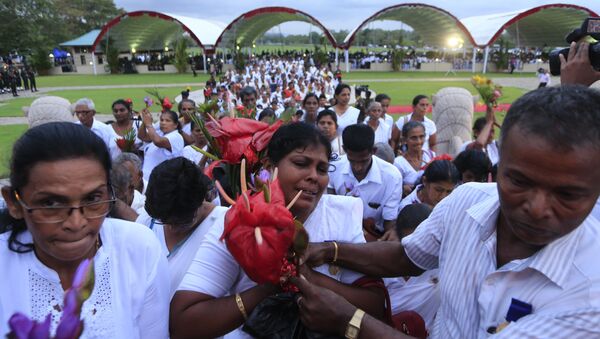On May 18 the diaspora around the world marked Tamil Genocide Day. On this day in 2009 the leader of the Tamil Tigers, Velupillai Prabhakaran, was declared dead and the guerrilla army he led was finally defeated by the Sri Lankan Army.
Prabhakaran's 12-year-old son Balachandran, was allegedly murdered by Sri Lankan soldiers.
Our 1st report “Legacies & Lessons –Sexual Violence vs men & boys in #SriLanka & #BiH” now available on our website https://t.co/DX414UtXcL pic.twitter.com/iRd3OgHId0
— All Survivors (@AllSurvivorsPro) May 16, 2017
It marked the end of the dream of Eelam, an independent homeland for the Tamil minority in the north and east of Sri Lanka.
As many as 150,000 Tamils are thought to have been killed in the final few weeks of the civil war which had lasted for 37 years.
Thousands of Tamil women were allegedly raped by Sri Lankan Army soldiers loyal to President Mahinda Rajapaksa.
Rajapaksa, who pandered to the nationalist excesses of the Sinhalese majority, was defeated in an election in 2015 and his successor Maithripala Sirisena was voted in with significant support from Tamil voters.
But a new report has claimed that Tamil men and boys are routinely being sexually assaulted in custody.
The All Survivors Project report found the issue was going under the radar because the stigma meant that few victims choose to speak out.
#Mullivaikkal Commemoration event that was banned yesterday was all set up for today. A heart-wrenching memorial 2 all Tamils killed in 2009 pic.twitter.com/6fIIX5JHCS
— Mari (@Mari_deSilva) May 18, 2017
The report says: "While the full extent of sexual violence against men and boys is not known…sexual violence against men and boys did not stop with the end of the war in May 2009."
"Incidents of sexual violence against men continue to be reported during arrests and detentions under the draconian Prevention of Terrorism Act, which has yet to be repealed or reformed despite commitments [by President Sirisena] to do so."
Charu Lata Hogg, Director, All Survivors Project, UCLA, School of Law and Associate Fellow, Chatham House, told Sputnik:
"Sexual violence is about power not gender. In many case ethnic humiliation is a driver of sexual violence. While ethnicity is not the only motivation for sexual violence in Sri Lanka, the majority of victims (male and female) who have been abused in detention in the context of the armed conflict are ethnic Tamils but Sinhalese and Muslims who were allegedly associated with the Tamil Tigers were abused too. Sexual violence in the context of conflict related detention in Sri Lanka has been used to humiliate detainees and in some cases obtain confessions which implicate them in acts of terrorism.
"Riven by internal struggles and a complex arrangement of power with the coalition partner United National Party, the Unity government has failed to stride ahead with basic reform, accountability for past abuses and transitional justice which it promised the minority Tamil and Muslim community."
Under Sri Lankan law homosexuality is illegal but the law also does not recognize male rape as a crime.
The Sri Lankan government has not responded to the allegations in the report.
#Jaffna University students today observed 8th anniversary of #Mullivaaikaal #LKA #SRILANKA #JAFFNAUNIVERSITY #CEYLON_MESSENGER pic.twitter.com/DJ88AcL16S
— Ceylon Messenger (@CeylonMessenger) May 18, 2017
On May 18 students at Jaffna University laid flowers in memory of the thousands of Tamils who were killed and in Sampur a handful of survivors of the Liberation Tigers of Tamil Eelam (LTTE) held a secret ceremony to remember their fallen leader.
Students at the University of Jaffna pay tribute to those killed in #Mullivaaikaal #may18 #remembermullivaikkal pic.twitter.com/PR6qxzcDVp
— sabeshwaran (@sabeshwaran) May 18, 2017
Chief Minister C V Wigneswaran, the Chief Minister of the overwhelmingly Tamil Northern Province, attended a vigil in the city of Mullivaikkal, close to the final battlefield.
The International Crisis Group this week warned Sri Lanka that failing to address the human rights abuses of the war years jeopardized any hope of a lasting peace.
In a report they said: "Two years into President Maithripala Sirisena's term, Sri Lanka's fragile hopes for lasting peace and cooperation across party and ethnic lines are imperiled…
"Neither the president nor prime minister has made a serious attempt to win support for a more inclusive polity or to reform the national security state to tackle the institutionalized impunity that has fed ethnic unrest and harmed all communities."
They went on to say: "Ambitious promises to improve the economy, eliminate corruption, restore rule of law, address the legacy of war and write a new constitution remain largely unrealized."
Frances Harrison, journalist and author of Still Counting The Dead, a book about the aftermath of the Sri Lankan civil war, said:
"President Sirisena keeps on reassuring the military they will never be held accountable for the past. He doesn't not represent a real transition but rather a rebranding, a realignment of Sinhala forces. He has increased civil liberties in the south but Tamils in the north still face repression which they have normalised. Most people worry the window of opportunity for real change in Sri Lanka is rapidly closing. It's likely to be a missed opportunity," Harrison told Sputnik.
Sri Lanka sits on vital shipping routes between the Far East and Europe and the Middle East and has been playing China and India off against each other as they both seek deals on new port facilities on the island.
Earlier this year Russia discussed possibly supplying Sri Lanka with two new frigates.


